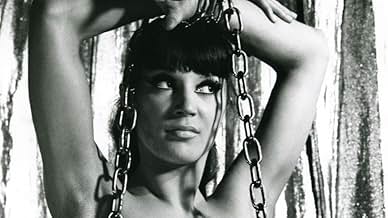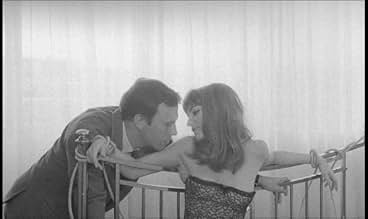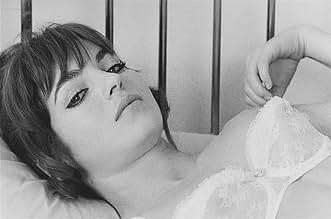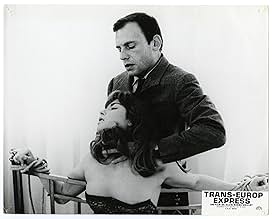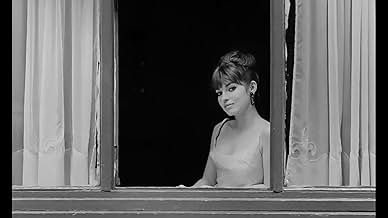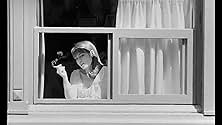Trans-Europ-Express
- 1966
- 1 Std. 45 Min.
IMDb-BEWERTUNG
7,0/10
2248
IHRE BEWERTUNG
Füge eine Handlung in deiner Sprache hinzuA director, producer and assistant take the Trans-Europ-Express from Paris to Antwerp, where they brainstorm ideas for a film about a greenhorn drug smuggler and a kinky prostitute.A director, producer and assistant take the Trans-Europ-Express from Paris to Antwerp, where they brainstorm ideas for a film about a greenhorn drug smuggler and a kinky prostitute.A director, producer and assistant take the Trans-Europ-Express from Paris to Antwerp, where they brainstorm ideas for a film about a greenhorn drug smuggler and a kinky prostitute.
- Regie
- Drehbuch
- Hauptbesetzung
Gérard Palaprat
- Le Petit Mathieu
- (as Gerard Palaprat)
Clotilde Vanesco
- Cabaret Singer
- (as Clo Vanesco)
Jérôme Lindon
- Train traveller
- (Nicht genannt)
Empfohlene Bewertungen
Given that TRANS-EUROP-EXPRESS is the only movie directed by Alain Robbe-Grillet which the late conservative British film critic Leslie Halliwell reviewed in his celebrated “Film Guide”, one would think that it was more accessible than his usual reportedly impenetrable stuff and, in a way, it is – but still, the end result is hardly straightforward and almost as cerebral!
Jean-Louis Trintignant, in the first of four films he made with Robbe-Grillet, plays a novice drug courier tested by his future employers in carrying a stash of cocaine (which is actually sugar) by train and depositing it into a train station locker – but this simple task is fraught with any number of unexpected complications including police interrogation and night-time chases. Marie-France Pisier is a very beguiling presence here as a whore/double agent with whom Trintignant has several S&M encounters in a hotel room until her ‘double face’ drives him to murder…or does it? Although I was aware that the actress had played Colette in Francois Truffaut’s Antoine Doinel series and had the leading role in the trashy THE OTHER SIDE OF MIDNIGHT (1977), looking at her filmography just now I was surprised to learn that she was also in one of my favorite films, Luis Bunuel’s THE PHANTOM OF LIBERTY (1974), as well as Jacques Rivette’s ambitious fantasy CELINE AND JULIE GO BOATING (1974; which I’ve just acquired via the BFI’s 2-Disc edition)!
What this film has that the other Robbe-Grillet titles I’ve watched (including THE IMMORTAL ONE [1963]) don’t, is a surprisingly substantial dose of humor: in fact, the writer-director himself appears as a train passenger who is contemplating a film about drug-trafficking which (given that he happens to be on the train himself) would be an ideal vehicle for Jean-Louis Trintignant!; similarly, when Trintignant and Pisier go to a café he tells her that the waiter who had just served them was not a waiter at all but an actor playing a waiter!; during one of the various meetings with his shady employers, Trintignant is asked to repeat where he is supposed to meet his contact – implying a very complicated route – he simply replies “Where” (at which his employer doesn’t even bat an eyelid!), etc. At one point, Robbe-Grillet’s fellow passengers complain that drug-trafficking is no longer hip and that diamond-smuggling is the current criminal fad; therefore, Trintignant & Co. exchange costumes and settings accordingly…before the director decides to stick to his original idea (whim?) after all! Incidentally, this ‘screenplay-in-the-making’ structure reminds one of the contemporaneous Hollywood comedy, Paris WHEN IT SIZZLES (1964), which was itself a remake of an earlier French original – Julien Duvivier’s LA FETE A' HENRIETTE (1952). In fact, the whole self-referential element in the film and its heady spoof on the thriller genre recalls the Jean-Luc Godard of BREATHLESS (1960), BAND OF OUTSIDERS (1964), ALPHAVILLE (1965) and PIERROT LE FOU (1965) more than anything else...
Unfortunately, what I said about the poor video quality of EDEN AND AFTER (1970) applies to an even greater extent here – since this one looked distinctly like a tenth-generation dupe (with actors’ features being quite blurred at times and especially, alas, during the S&M striptease act towards the end). That said, the film itself is let down somewhat by sluggish pacing – even if the version I watched ran for a mere 88 minutes, when all sources I know of give its running-time as 105! As it is, I’d welcome a legitimate DVD release of TRANS-EUROP-EXPRESS and one hopes that the recent passing of its creator will inspire adventurous labels to pursue its rights.
Jean-Louis Trintignant, in the first of four films he made with Robbe-Grillet, plays a novice drug courier tested by his future employers in carrying a stash of cocaine (which is actually sugar) by train and depositing it into a train station locker – but this simple task is fraught with any number of unexpected complications including police interrogation and night-time chases. Marie-France Pisier is a very beguiling presence here as a whore/double agent with whom Trintignant has several S&M encounters in a hotel room until her ‘double face’ drives him to murder…or does it? Although I was aware that the actress had played Colette in Francois Truffaut’s Antoine Doinel series and had the leading role in the trashy THE OTHER SIDE OF MIDNIGHT (1977), looking at her filmography just now I was surprised to learn that she was also in one of my favorite films, Luis Bunuel’s THE PHANTOM OF LIBERTY (1974), as well as Jacques Rivette’s ambitious fantasy CELINE AND JULIE GO BOATING (1974; which I’ve just acquired via the BFI’s 2-Disc edition)!
What this film has that the other Robbe-Grillet titles I’ve watched (including THE IMMORTAL ONE [1963]) don’t, is a surprisingly substantial dose of humor: in fact, the writer-director himself appears as a train passenger who is contemplating a film about drug-trafficking which (given that he happens to be on the train himself) would be an ideal vehicle for Jean-Louis Trintignant!; similarly, when Trintignant and Pisier go to a café he tells her that the waiter who had just served them was not a waiter at all but an actor playing a waiter!; during one of the various meetings with his shady employers, Trintignant is asked to repeat where he is supposed to meet his contact – implying a very complicated route – he simply replies “Where” (at which his employer doesn’t even bat an eyelid!), etc. At one point, Robbe-Grillet’s fellow passengers complain that drug-trafficking is no longer hip and that diamond-smuggling is the current criminal fad; therefore, Trintignant & Co. exchange costumes and settings accordingly…before the director decides to stick to his original idea (whim?) after all! Incidentally, this ‘screenplay-in-the-making’ structure reminds one of the contemporaneous Hollywood comedy, Paris WHEN IT SIZZLES (1964), which was itself a remake of an earlier French original – Julien Duvivier’s LA FETE A' HENRIETTE (1952). In fact, the whole self-referential element in the film and its heady spoof on the thriller genre recalls the Jean-Luc Godard of BREATHLESS (1960), BAND OF OUTSIDERS (1964), ALPHAVILLE (1965) and PIERROT LE FOU (1965) more than anything else...
Unfortunately, what I said about the poor video quality of EDEN AND AFTER (1970) applies to an even greater extent here – since this one looked distinctly like a tenth-generation dupe (with actors’ features being quite blurred at times and especially, alas, during the S&M striptease act towards the end). That said, the film itself is let down somewhat by sluggish pacing – even if the version I watched ran for a mere 88 minutes, when all sources I know of give its running-time as 105! As it is, I’d welcome a legitimate DVD release of TRANS-EUROP-EXPRESS and one hopes that the recent passing of its creator will inspire adventurous labels to pursue its rights.
10cbreyno
This film is a beautifully done story within a story --- film within a film. The author and friends take a train ride and begin to work out a film; its plot, its characters and their actions. As the story evolves the characters take on their own existence, reality becomes inverted; they weave their own story as author becomes audience.
It is a taste of the 1960's thinking of the Michael Caine foreign intrigue films, The Orient Express not to mention the Manchurian Candidate. In a way it thumbs its nose at the genre.
I saw it when it ran almost forty years ago and enjoyed it immensely. If you can find it --- check it out.
It is a taste of the 1960's thinking of the Michael Caine foreign intrigue films, The Orient Express not to mention the Manchurian Candidate. In a way it thumbs its nose at the genre.
I saw it when it ran almost forty years ago and enjoyed it immensely. If you can find it --- check it out.
On board the TEE is 'Elias' (Jean-Louis Trintignant), a paranoid drug dealer on his way from Paris to Antwerp. And in another compartment are his creators; film-makers having a script meeting from which Elias emerges. It's a typical Robbe-Grillet construct, honed from nouveau roman experiments. The purpose of which, as he puts it, is to "assist change by throwing out any techniques which try to impose order or a particular interpretation on events". The result in this case is a parallel universe, on one hand Elias trying to act like a drug dealer and on the other, proceeding according to the whims of his creators. In effect, it becomes a real-time replay of the writing and editing process,
There are those who might regard this as typical French pretension, full of intellectual conceit (it was banned in England for many years), but it's playful, witty and very accessible thanks to a droll script and the great Jean-Louis. And then there's the beautiful Marie-France Pisier with her large inquisitive eyes. She makes an unlikely hooker, but is she? The scriptwriter on the train is played by Robbe-Grillet himself and so establishing that he really is making it up as he goes along. It's beautifully shot in crisp b&w, perfectly capturing the zeitgeist. It would be another twelve years before Kraftwerk created their musical homage to the great train, but it says something about both forms that it would have made the perfect soundtrack.
There are those who might regard this as typical French pretension, full of intellectual conceit (it was banned in England for many years), but it's playful, witty and very accessible thanks to a droll script and the great Jean-Louis. And then there's the beautiful Marie-France Pisier with her large inquisitive eyes. She makes an unlikely hooker, but is she? The scriptwriter on the train is played by Robbe-Grillet himself and so establishing that he really is making it up as he goes along. It's beautifully shot in crisp b&w, perfectly capturing the zeitgeist. It would be another twelve years before Kraftwerk created their musical homage to the great train, but it says something about both forms that it would have made the perfect soundtrack.
Director Alain Robbe-Grillet certainly polarises opinion. Everything from 'genius' to 'BS-artist'! Many reviews I have read are just as pretentious as his films are accused of being.
As a leading figure of the 'Nouveau Roman' school it was a natural progression to the medium of film where he could portray the 'natural disorder of things' and reach a far wider audience.
His unconventional structure suits this film perfectly as the director, playing himself, is literally making it up as he goes along whilst sitting on a train.
In this he also has the services of two charismatic leads, Jean-Louis Trintignant and Marie -France Pisier plus Willy Kurant's splendid camera work.
Many found the erotic images discomforting and although the bondage scenes in this are more M&S than S&M they were considered shocking enough in the mid-1960's to keep the film off British screens for quite a few years.
Robbe-Grillet's film is easily his most accessible and works wonderfully as Film Noir spoof. It is great fun and should not be taken too seriously.
The films of Alain Robbe-Grillet may be clever, intellectually stimulating and effective but they can also be over serious and difficult to watch. This one is almost a complete joy. Beautifully photographed in wonderfully crisp b/w it looks great throughout. The director and his wife appear as passengers on the famous train, travelling to Antwerp and decide to conjure up a spy story. The superb, Jean-Louis Trintignant is the main man here and would appear to be the puppet for their story. Certainly we see him carrying out the actions they dictate into their tape recording machine as he goes hither and thither around the great city, of which we see much. Indeed, Antwerp being a favourite city of mine is another reason for this being so pleasurable for me to watch. The biggest surprise for me here, was not the much heralded, though undeniably effective S&M sequences but the extent to which humour plays a part here. There is a Bond poster on the wall at one point, as well as a shot from a Goddard film and it would seem Mr Grillet is also having a bit of a go at the very genre itself. Marvellous.
Wusstest du schon
- WissenswertesThis film was banned for a time by the British Censor because of its depiction of sexual bondage (which is now regarded as very tame). However, the ban was lifted at around the end of the 1960s.
- VerbindungenReferences James Bond 007 - Liebesgrüße aus Moskau (1963)
- SoundtracksLa Traviata
Top-Auswahl
Melde dich zum Bewerten an und greife auf die Watchlist für personalisierte Empfehlungen zu.
- How long is Trans-Europ-Express?Powered by Alexa
Details
- Erscheinungsdatum
- Herkunftsländer
- Sprachen
- Auch bekannt als
- Транс'європейський експрес
- Drehorte
- Central Station, Antwerp, Flanders, Belgien(railway station)
- Produktionsfirmen
- Weitere beteiligte Unternehmen bei IMDbPro anzeigen
- Laufzeit
- 1 Std. 45 Min.(105 min)
- Farbe
- Sound-Mix
- Seitenverhältnis
- 1.66 : 1
Zu dieser Seite beitragen
Bearbeitung vorschlagen oder fehlenden Inhalt hinzufügen


